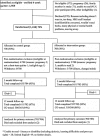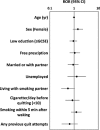Self-help educational booklets for the prevention of smoking relapse following smoking cessation treatment: a randomized controlled trial
- PMID: 26235659
- PMCID: PMC4832320
- DOI: 10.1111/add.13080
Self-help educational booklets for the prevention of smoking relapse following smoking cessation treatment: a randomized controlled trial
Abstract
Aims: Most people who quit smoking for a short term will return to smoking again in 12 months. We tested whether self-help booklets can reduce relapse in short-term quitters after receiving behavioural and pharmacological cessation treatment.
Design: A parallel-arm, pragmatic individually randomized controlled trial.
Setting: Smoking cessation clinics in England. Participants People who stopped smoking for 4 weeks after receiving cessation treatment in stop smoking clinics.
Intervention: Participants in the experimental group (n=703) were mailed eight booklets, each of which taught readers how to resist urges to smoke. Participants in the control group (n=704) received a leaflet currently used in practice.
Measurements: The primary outcome was prolonged, carbon monoxide-verified abstinence from months 4 to 12. The secondary outcomes included 7-day self-reported abstinence at 3 and 12 months. Mixed-effects logistic regression was used to estimate treatment effects and to investigate possible effect modifying variables.
Findings: There were no statistically significant differences between the groups in prolonged abstinence from months 4 to 12 (36.9% versus 38.6%; odds ratio 0.93, 95% confidence interval 0.75-1.16; P=0.524). In addition, there were no significant differences between the groups in any secondary outcomes. However, people who reported knowing risky situations for relapse and using strategies to handle urges to smoke were less likely to relapse.
Conclusions: In people who stop smoking successfully with behavioural support, a comprehensive self-help educational programme to teach people skills to identify and respond to high-risk situations for return to smoking did not reduce relapse.
Keywords: Behavioural support; coping skills; educational booklets; smoking relapse.
© 2015 The Authors. Addiction published by John Wiley & Sons Ltd on behalf of Society for the Study of Addiction.
Figures
References
-
- World Health Organization (WHO) WHO Report on the Global Tobacco Epidemic, 2013. Geneva: WHO; 2013.
-
- Giovino G. A., Mirza S. A., Samet J. M., Gupta P. C., Jarvis M. J., Bhala N. et al. Tobacco use in 3 billion individuals from 16 countries: an analysis of nationally representative cross‐sectional household surveys. Lancet 2012; 380: 668–79. - PubMed
-
- Jha P., Peto R. Global effects of smoking, of quitting, and of taxing tobacco. N Engl J Med 2014; 370: 60–8. - PubMed
-
- Zwar N. A., Mendelsohn C. P., Richmond R. L. Supporting smoking cessation. BMJ 2014; 348: f7535. - PubMed
-
- Ferguson J., Bauld L., Chesterman J., Judge K. The English smoking treatment services: one‐year outcomes. Addiction 2005; 100: 59–69. - PubMed
Publication types
MeSH terms
Associated data
Grants and funding
LinkOut - more resources
Full Text Sources
Other Literature Sources
Medical




